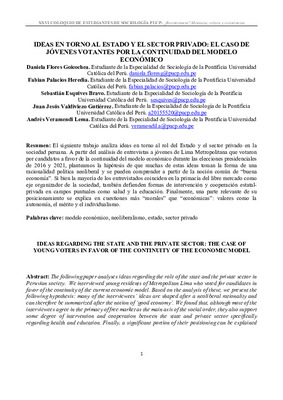| dc.contributor.author | Flores Goicochea, Daniela | |
| dc.contributor.author | Palacios Heredia, Fabian | |
| dc.contributor.author | Esquives Bravo, Sebastián | |
| dc.contributor.author | Valdiviezo Gutiérrez, Juan Jesús | |
| dc.contributor.author | Veramendi Lema, Andrés | |
| dc.date.accessioned | 2022-07-12T15:32:31Z | |
| dc.date.available | 2022-07-12T15:32:31Z | |
| dc.date.issued | 2021 | |
| dc.identifier.uri | https://repositorio.pucp.edu.pe/index/handle/123456789/185633 | |
| dc.description.abstract | El siguiente trabajo analiza ideas en torno al rol del Estado y el sector privado en la
sociedad peruana. A partir del análisis de entrevistas a jóvenes de Lima Metropolitana que votaron
por candidatos a favor de la continuidad del modelo económico durante las elecciones presidenciales
de 2016 y 2021, planteamos la hipótesis de que muchas de estas ideas toman la forma de una
racionalidad política neoliberal y se pueden comprender a partir de la noción común de “buena
economía”. Si bien la mayoría de los entrevistados coinciden en la primacía del libre mercado como
eje organizador de la sociedad, también defienden formas de intervención y cooperación estatalprivada
en campos puntuales como salud y la educación. Finalmente, una parte relevante de su
posicionamiento se explica en cuestiones más “morales” que “económicas”: valores como la
autonomía, el mérito y el individualismo. | es_ES |
| dc.description.abstract | The following paper analyses ideas regarding the role of the state and the private sector in
Peruvian society. We interviewed young residents of Metropolitan Lima who voted for candidates in
favor of the continuity of the current economic model. Based on the analysis of these, we present the
following hypothesis: many of the interviewees’ ideas are shaped after a neoliberal rationality and
can therefore be summarized after the notion of ‘good economy’. We found that, although most of the
interviewees agree in the primacy of free market as the main axis of the social order, they also support
some degree of intervention and cooperation between the state and private sector specifically
regarding health and education. Finally, a significant portion of their positioning can be explained through ‘moral’ aspects rather than economic ones: values such as autonomy, merit and
individualism. | es_ES |
| dc.language.iso | spa | es_ES |
| dc.publisher | Pontificia Universidad Católica del Perú | es_ES |
| dc.rights | info:eu-repo/semantics/openAccess | es_ES |
| dc.rights.uri | http://creativecommons.org/licenses/by-nc-nd/2.5/pe/ | * |
| dc.subject | Modelo económico | es_ES |
| dc.subject | Neoliberalismo | es_ES |
| dc.subject | Estado | es_ES |
| dc.subject | Sector privado | es_ES |
| dc.subject | Economic model | es_ES |
| dc.subject | Neoliberalism | es_ES |
| dc.subject | Private sector | es_ES |
| dc.title | Ideas en torno al estado y el sector privado: el caso de jóvenes votantes por la continuidad del modelo económico | es_ES |
| dc.type | info:eu-repo/semantics/conferenceObject | es_ES |
| dc.subject.ocde | https://purl.org/pe-repo/ocde/ford#5.04.01 | es_ES |
| dc.publisher.country | PE | es_ES |


